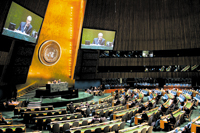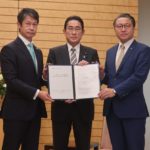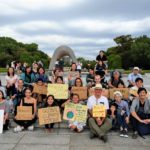chapter2-1Part2: Action Proposals 1.Actions toward Disarmament
What, then, can we do in facing those three challenges? Here is the list of specific proposals that should be pursued.
a.Promoting disarmament and non-proliferation
We believe the new START process between the US and Russia to be a step in the right direction that should be supported by the international community. Moreover, this process should seek active engagement from other nuclear-armed states, so that the present bilateral process of nuclear arms reduction can develop into a multilateral process of nuclear arms control and eventual reduction.
More specifically, we believe the following measures to be of particular importance in further development of the nuclear disarmament process, all of which have been proposed in the past but not yet implemented.
1)All nuclear-armed states should now explicitly commit not to increase the number of their nuclear weapons.
2)We welcome the agreement among the UK, France, and China for a nuclear-free future, and urge them to submit concrete proposals for the eventual reduction of their nuclear weapons in order to launch a multilateral disarmament process that includes all nuclear-armed states.
3)New and unequivocal negative security assurances should be given by all nuclear-armed states that they will not use nuclear weapons against any NPT-compliant non-nuclear-armed state.
4)The negotiations on nuclear disarmament must involve the non-nuclear states in substantive roles, and must seek out possible roles for local governments and non-governmental actors in civil society.
b.Reducing reliance on nuclear weapons
The end of the Cold War, which provided the basis for the START process, was essentially a development between the US, Russia, and Europe, while the security arrangements for the rest of the world more or less remained untouched; nuclear disarmament was excluded from efforts aimed at tension reduction and conflict management. The Six-Party Talks on the future of the Korean Peninsula was the sole exception to this, but the outcomes of the negotiation has so far been limited.
What is needed here is a process that will build confidence among potential adversaries so that each power may reduce reliance on nuclear deterrence for its security. This is a tall order, for no power will be willing to give up its nuclear arsenal without sufficient assurance of its security. We propose a series of international negotiations, to be held first in the city of Hiroshima that brings together nuclear and non-nuclear powers in the Asia-Pacific region to consider possible measures for easing tensions and the mutually reducing nuclear arms.
More particularly, governments in the Asia-Pacific region should start the following:
1)The Six-Party Talks in Northeast Asia should be pursued not only to successfully resolve the North Korean nuclear issue, but also to establish security in East Asia without the current dependence on nuclear deterrence.
2)Every effort should be made to achieve the participation of the non-NPT nuclear states in the effort to attain a world without nuclear weapons, and to reduce the role of nuclear weapons in their respective regions.
3)All states should agree to take effective measures to strengthen the security of nuclear materials and facilities, both military and civilian, effectively countering the possibility of nuclear terrorism.
c.Strengthening international mechanisms
Diplomatic negotiations on conflict management must be accompanied by efforts among international institutions that govern nuclear arms control and non-proliferation. We strongly support the recommendations made by the International Commission on Nuclear Non-proliferation and Disarmament (ICNND), and would like to propose a regional process that focuses on the following agenda:
1)The role of the IAEA in monitoring the development of nuclear energy-related facilities should be strengthened. We also propose a parallel regional system in Asia that will support the global efforts of the IAEA at the regional level.
2)More efforts should be made in multilateral management of enrichment, reprocessing, and spent fuel storage facilities in the Asian region. These efforts should cover the management of all civilian use of nuclear materials.
3)We will seek all nations in the Asian region to share firm commitments to the development of a multilateral security system that reduces the significance of nuclear weapons in their deterrent utility.

[Photo Courtesy] UNITAR Hiroshima Office








